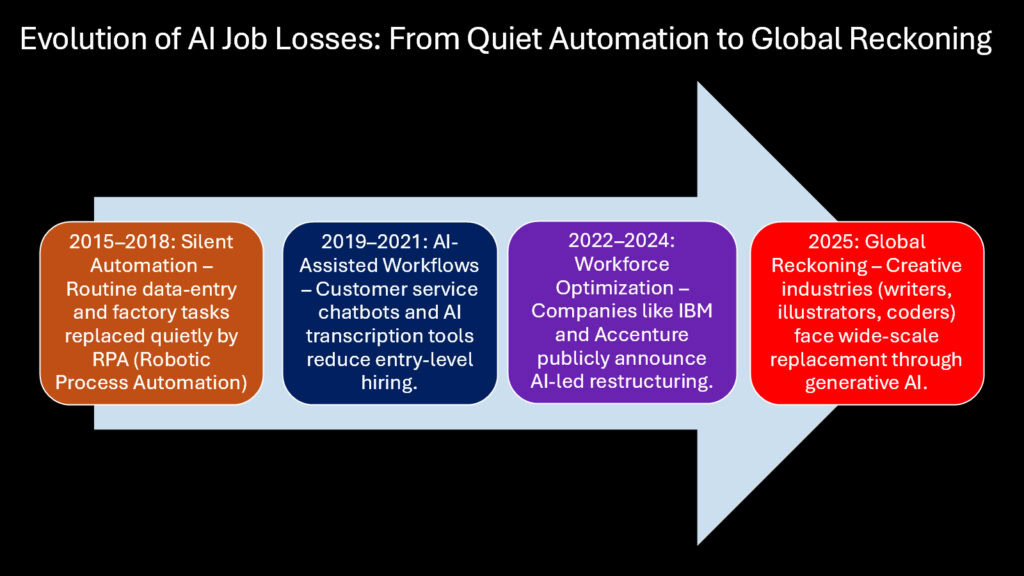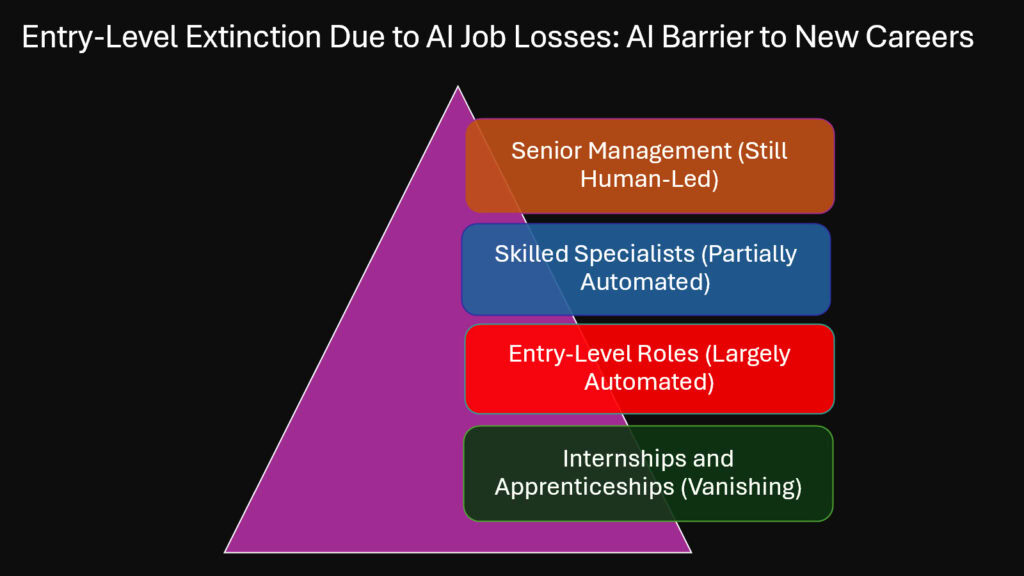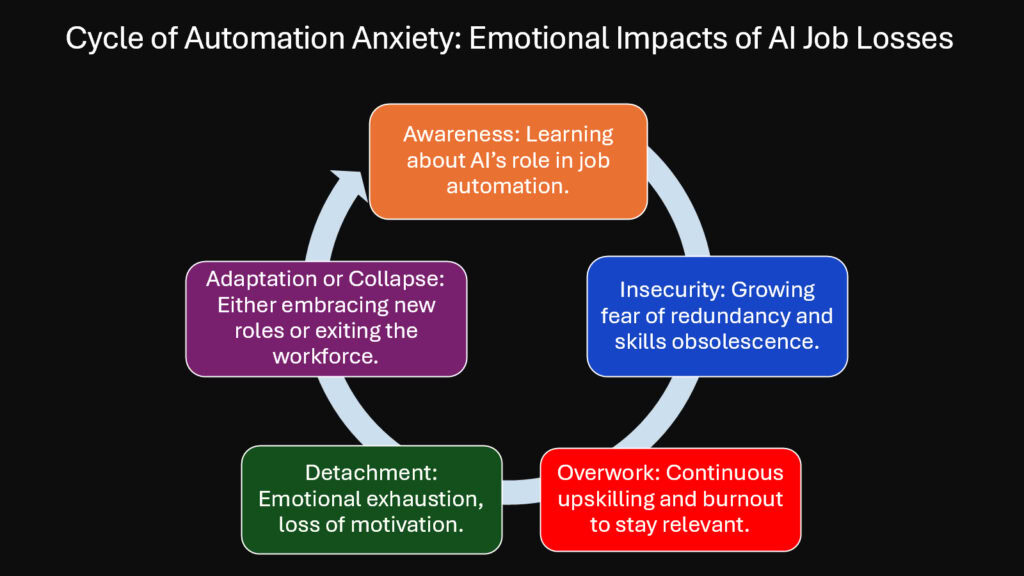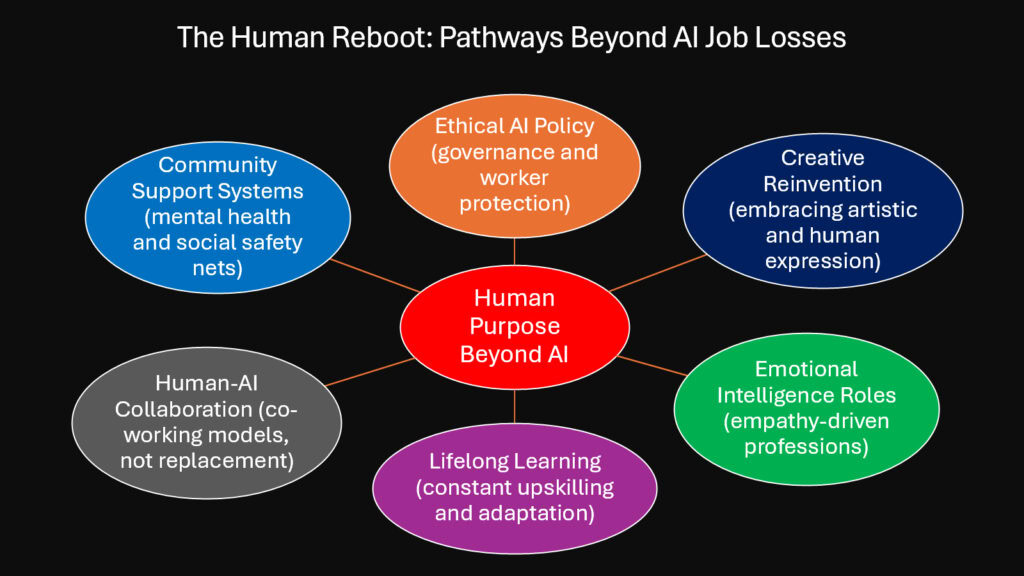Table of Contents
Introduction: The Alarming Rise of AI Job Losses and What It Means for Us

Sarah had spent twelve years perfecting her craft as a copywriter. She understood brand voice, consumer psychology, and the delicate art of persuasion. Last spring, her agency informed her that generative AI would now handle most client briefs. Within three months, her position was eliminated. Sarah’s story is not isolated anymore. What began as a quiet corporate restructuring has evolved into a global transformation that touches every profession and every worker who once believed their skills were irreplaceable.
AI job losses have accelerated beyond the factory floor and call centers. They now reach into creative studios, medical offices, legal firms, and software development departments. The technology that promised to augment human capability is increasingly replacing it altogether. Companies report significant cost savings while workers face an uncertain future. This shift represents more than an economic adjustment. It challenges how we define our purpose, our identity, and our place in a world where algorithms can mimic human output with startling accuracy.
The transformation is neither subtle nor slow. Organizations across industries are adopting AI systems that can write, design, analyze, and even code with minimal human oversight. The efficiency gains are undeniable, but the human cost remains largely unexamined. Behind every percentage point of productivity improvement lies a person whose livelihood has been disrupted or destroyed.
This article explores six devastating impacts of AI job losses that extend far beyond unemployment statistics. We examine how creative professionals lose their livelihoods, how young workers find entry paths blocked, how skilled experts face obsolescence, how psychological trauma spreads through workforces, how professional identity crumbles under algorithmic pressure, and how economic inequality widens as machines capture value that once belonged to human labor.
AI Job Losses: Jobs Already Replaced or Likely to Be Replaced by AI
| Job Role | Replacement Status |
|---|---|
| Data Entry Clerks | Already widely replaced by automated systems |
| Customer Service Representatives | Increasingly replaced by chatbots and virtual assistants |
| Telemarketing Agents | Being replaced by AI-powered voice systems |
| Basic Content Writers | Partially replaced by generative AI tools |
| Junior Graphic Designers | Facing displacement from AI design platforms |
| Bank Tellers | Declining due to mobile banking and AI systems |
| Paralegal Assistants | Document review automated by AI legal tools |
| Inventory Management Staff | Replaced by predictive AI and automation |
| Basic Accounting Roles | Automated by AI-driven financial software |
| Assembly Line Workers | Increasingly replaced by robotic automation |
1. AI Job Losses and the Collapse of Creative Professions
Creative work was supposed to be the sanctuary. Writers, designers, illustrators, and musicians believed their professions required something machines could never possess: genuine human creativity and emotional depth. That assumption has crumbled with startling speed. Generative AI tools like ChatGPT, Midjourney, and Suno now produce content that clients find acceptable, sometimes indistinguishable from human work. The result is a fundamental restructuring where human artists are becoming optional rather than essential.
Marketing agencies have been among the first to embrace this shift. A mid-sized design firm in San Francisco reduced its staff from forty-two creatives to eighteen within eighteen months of adopting AI tools. The remaining employees now function primarily as editors, refining machine-generated output rather than creating original work. The agency’s founder justified the decision by pointing to client budgets that demand faster turnaround and lower costs.
Freelance creative professionals face even harsher realities. Platforms that once connected writers and designers with clients now feature AI-generated alternatives at a fraction of the cost. A thousand-word article that might have earned a writer one hundred fifty dollars now competes with AI-generated content produced for pennies. Illustrators watch potential commissions vanish as clients generate their own images through text-to-image systems.
Music production has entered similar territory. AI composition tools can now generate background music, jingles, and even full songs in specific styles. Production companies that once hired session musicians and composers now generate tracks algorithmically. For musicians who relied on commercial work to support their artistic projects, these opportunities are disappearing rapidly.
The impact of AI job losses extends beyond individual livelihoods. When creative work becomes commodified and automated, society loses the diversity of human expression that comes from different perspectives and experiences. AI systems train on existing work, essentially remixing what already exists. As human creatives exit the field, the cultural pool from which AI learns becomes stagnant.
AI Job Losses: Creative Professions Facing AI Displacement
| Creative Field | Impact of AI Job Losses |
|---|---|
| Copywriting and Content Writing | Mass displacement by generative text AI |
| Graphic Design and Illustration | Entry and mid-level positions automated |
| Stock Photography | Replaced by AI-generated imagery |
| Music Composition for Media | Background and commercial music automated |
| Video Editing | Basic editing automated by AI tools |
| Translation Services | Routine translation replaced by neural networks |
2. AI Job Losses and the Death of Entry-Level Opportunities

Young professionals entering the workforce face a troubling reality: the ladder they need to climb is missing its bottom rungs. Entry-level positions have traditionally served as training grounds where new graduates learn industry norms and develop professional skills. AI automation is systematically eliminating these positions, leaving young workers with nowhere to begin their careers.
Journalism provides a stark example. Junior reporters once spent years covering local beats, learning to verify sources and develop their writing voice. Today, AI systems generate routine news reports about earnings announcements and sports scores. News organizations see little reason to hire junior reporters when algorithms can produce adequate coverage at no ongoing cost. The few entry positions that remain demand experience levels that were once considered mid-career.
Marketing departments have similarly eliminated assistant and coordinator roles. Tasks like social media scheduling, basic analytics reporting, and email campaign management now run through automated systems. Young marketing graduates find themselves competing for positions that require five years of experience because companies skip the training phase entirely.
Software development faces the same pressure. Junior developer positions where programmers once learned coding standards and debugging techniques are vanishing. AI coding assistants can now generate functional code from natural language descriptions. Companies question why they should invest in training junior programmers when senior developers using AI tools can produce more output.
This elimination of entry-level work creates a vicious cycle. Without opportunities to gain experience, young professionals cannot develop the advanced skills that might protect them from automation. They remain trapped in gig economy positions or underemployment, unable to access the career trajectories that previous generations took for granted. The social contract that promised education would lead to employment is breaking down.
AI Job Losses: Entry-Level Positions Eliminated by AI
| Field | Entry Roles Disappearing |
|---|---|
| Journalism | Junior reporters and fact-checkers |
| Marketing | Social media coordinators and content assistants |
| Finance | Junior analysts and data processors |
| Legal | Paralegal and document review positions |
| Technology | Junior developers and QA testers |
| Human Resources | Recruiting coordinators and benefits administrators |
3. AI Job Losses and the Displacement of Skilled Workers
The assumption that advanced education and specialized skills provide job security is collapsing. Professionals who spent years developing expertise in coding, data analysis, and engineering now watch as AI systems perform their tasks with comparable or superior results. This displacement is not limited to routine work. AI can now handle complex problem-solving and pattern recognition that once required human judgment and experience.
IBM announced plans to pause hiring for roles that could be replaced by AI, specifically targeting back-office functions. The company suggested that nearly eight thousand positions might eventually be automated. Accenture and other consulting firms have similarly integrated AI tools that reduce their need for mid-level analysts. These are not low-skill positions but professional roles requiring university degrees and years of experience.
Software engineers face particularly ironic displacement. The professionals who built the digital economy now find their own work automated by the systems they created. AI coding assistants can generate complex functions, debug existing code, and even architect entire systems based on requirements documents. Companies that once hired large development teams now operate with skeleton crews who manage AI-generated code.
Financial analysts encounter similar pressures. Machine learning algorithms can analyze market trends, assess risk, and generate investment recommendations faster than human analysts. They process vastly more data and identify patterns invisible to human observation. Hedge funds and investment banks have steadily reduced their analyst workforces while expanding their AI capabilities.
This shift fundamentally changes what we mean by skill in the digital economy. Technical knowledge alone no longer suffices. Workers need skills that AI cannot easily replicate: emotional intelligence, ethical judgment, and creative problem-solving in ambiguous situations. Yet these skills were not emphasized in the STEM education push of recent decades.
AI Job Losses: Skilled Professions Facing AI Automation
| Professional Field | Nature of Displacement |
|---|---|
| Software Development | Code generation and debugging automated |
| Financial Analysis | Algorithmic trading and risk assessment |
| Radiology | AI image analysis replacing routine scans |
| Legal Research | Document analysis and case law searches |
| Engineering Design | Generative design and optimization tools |
| Accounting | Automated audits and tax preparation |
4. AI Job Losses and the Mental Toll of Uncertainty

The psychological impact of AI job losses extends far beyond those who have already lost positions. Millions of workers now live with automation anxiety: the persistent fear that their job will be next, that their skills are becoming obsolete. This chronic stress takes a serious toll on mental health, relationships, and overall wellbeing. The uncertainty itself becomes a form of trauma that permeates daily life.
Workers describe feeling constantly on edge, unable to relax even during time off. Every company announcement triggers anxiety about restructuring. Every new AI tool feels like a potential replacement. This state of hypervigilance exhausts people mentally and physically. They experience difficulty sleeping, increased irritability, and declining job satisfaction.
Those who have lost jobs to AI face additional challenges. Unlike traditional layoffs where workers could blame economic cycles, AI displacement carries an implication that the worker was simply less valuable than a machine. This comparison wounds deeper than typical job loss. People question their fundamental worth and competence when their life’s work has been deemed replaceable by an algorithm.
The pressure to stay relevant creates its own trauma. Workers feel compelled to constantly upskill, learn new tools, and prove their continued value. They sacrifice evenings and weekends to online courses, hoping to stay ahead of automation. This grind leads to burnout, family strain, and health problems. Many of these efforts prove futile when AI advances render new skills obsolete as quickly as workers acquire them.
Young workers entering the job market carry particularly heavy psychological burdens. They face pressure to choose careers carefully, avoiding fields that might disappear before they retire. Yet predicting which professions will survive decades of AI advancement is nearly impossible. This uncertainty paralyzes decision-making and fuels existential anxiety about the future.
Psychological Impacts of AI Job Losses
| Mental Health Effect | Description |
|---|---|
| Automation Anxiety | Chronic fear of job loss to AI systems |
| Identity Crisis | Loss of self-worth tied to professional role |
| Burnout | Exhaustion from constant upskilling pressure |
| Depression | Clinical symptoms following displacement |
| Decision Paralysis | Inability to commit to career paths |
| Relationship Strain | Family stress from financial and emotional pressure |
5. AI Job Losses and the Erosion of Human Identity at Work
Work provides more than income. For many people, their profession forms a core part of their identity. Teachers define themselves by shaping young minds. Journalists see themselves as truth-seekers. When AI replaces these roles or reduces them to algorithmic outputs, it strips away more than livelihoods. It removes a fundamental source of meaning and purpose.
Consider Maria, a translator who spent twenty years mastering three languages and understanding the cultural nuances that make translation an art. Neural translation systems can now convert text between languages instantly. Maria’s services are rarely needed. She describes feeling as though her life’s work has been declared worthless. The identity she built as someone who bridges cultures has been reduced to a commodity that machines perform better.
Teachers face similar existential questions as educational AI systems deliver personalized instruction to students. The role of educator as knowledge transmitter is being automated. While human teachers still provide emotional support and mentorship, the core academic function is increasingly handled by adaptive learning systems. Teachers who defined themselves primarily as knowledge experts must reconstruct their professional identity.
This erosion of identity affects entire communities. In regions where specific industries dominate, collective identity forms around shared work. When AI displaces that work, communities lose their sense of purpose and cohesion. Former manufacturing towns have experienced this trauma for decades. Now white-collar communities face the same dissolution.
The challenge of reconstructing identity after AI displacement is profound. Unlike previous technological shifts that moved workers from one sector to another, AI threatens to make human labor itself less central to economic value creation. If machines can do most cognitive and physical work, what role remains for humans? This question goes beyond career counseling into philosophy.
AI Job Losses and Professional Identity Loss Across Sectors
| Profession | Identity Impact |
|---|---|
| Translators | Cultural bridge role eliminated by neural networks |
| Teachers | Knowledge expert identity diminished by adaptive AI |
| Journalists | Gatekeeper and truth-seeker role automated |
| Accountants | Trusted advisor reduced to software oversight |
| Craftspeople | Artisan identity replaced by algorithmic production |
| Doctors | Diagnostic expertise challenged by AI accuracy |
6. AI Job Losses and the Economic Divide Between Humans and Machines
The economic reality of AI job losses reveals a troubling pattern: companies using AI see profits rise while their workforces shrink and wages stagnate. This dynamic concentrates wealth among capital owners and AI developers while distributing losses across displaced workers. The algorithmic boom enriches a small elite while creating economic insecurity for millions.
Tech companies deploying AI report remarkable efficiency gains. A customer service department that once employed five hundred people can now operate with fifty, supported by chatbots and automated systems. The company saves millions in salary and benefits while maintaining or improving service levels. Those savings flow to shareholders and executives, not to the workers who were replaced.
Investment in AI technology has exploded while wage growth has remained flat or negative in real terms for most workers. Venture capital floods into AI startups promising to automate various industries. The stock market rewards companies that announce AI-driven workforce reductions. Meanwhile, unemployment benefits and retraining programs receive inadequate funding.
This pattern resembles historical moments of technological disruption, but with a crucial difference. Previous automation waves eventually created new jobs in new industries. Workers displaced from agriculture found work in manufacturing. But AI threatens to automate cognitive work faster than new employment categories can emerge. The service economy itself is being automated.
The geographic dimension of this divide adds another layer of concern. AI development concentrates in a few coastal tech hubs where wealth accumulates. Job displacement occurs everywhere else. Regions dependent on industries vulnerable to AI face economic collapse without replacement industries.
The question of who benefits from AI is not merely academic. It determines whether technological progress serves broad human flourishing or narrow private gain. Current trends suggest the latter. Without policy intervention to redistribute AI-generated value, the economic divide will continue widening until social systems break under the strain.
AI Job Losses: Economic Disparities Created by AI Automation
| Economic Indicator | Trend |
|---|---|
| Corporate Profits | Rising significantly with AI adoption |
| Worker Wages | Stagnant or declining in real terms |
| Tech Investment | Massive capital inflows to AI development |
| Unemployment | Rising in automatable sectors |
| Income Inequality | Widening gap between owners and workers |
| Regional Disparity | Wealth concentration in tech hubs |
Conclusion: Reclaiming Purpose in the Age of AI Job Losses

The six devastating impacts explored in this article reveal a truth that transcends economics: AI job losses represent a crisis of meaning as much as a crisis of employment. When creative professionals lose their livelihoods, when young people find career paths blocked, when skilled workers face obsolescence, when psychological trauma spreads, when professional identity crumbles, and when economic inequality widens, we are witnessing the unraveling of social contracts that have defined modern life.
The collapse of creative professions shows us that no work is truly safe from algorithmic replication. The death of entry-level opportunities reveals how AI disrupts future workforce development. The displacement of skilled workers demonstrates that education no longer guarantees security. The mental toll exposes the psychological price of perpetual anxiety. The erosion of identity forces us to confront what it means to be human when productivity becomes optional. The economic divide raises fundamental questions about who benefits from progress.
Yet this analysis need not end in despair. Recognition of the problem is the first step toward meaningful response. Several pathways forward deserve serious consideration. Upskilling programs, if properly funded, could help workers transition to roles that complement AI. Policy interventions like universal basic income or profit-sharing could redistribute economic gains more equitably. Educational reform could emphasize uniquely human capabilities like emotional intelligence and ethical reasoning.
Perhaps most importantly, we need to redefine human value beyond economic productivity. If AI can perform most tasks, society must find ways to honor human flourishing that does not depend on labor market participation. This might mean strengthening communities, supporting artistic expression, or creating spaces for people to contribute in ways that are not easily monetized.
The age of AI job losses demands that we preserve what makes us human: our capacity for empathy, our moral reasoning, our ability to find meaning in relationships, and our drive to create and connect. These qualities have value independent of economic productivity. A future where human beings retain dignity in a machine-dominated world is possible, but only if we choose to build it deliberately.
Strategies for Navigating AI Job Losses
| Approach | Potential Impact |
|---|---|
| Upskilling Programs | Transition workers to AI-complementary roles |
| Universal Basic Income | Provide economic security beyond employment |
| Educational Reform | Emphasize uniquely human capabilities |
| Policy Intervention | Redistribute AI-generated economic value |
| Community Strengthening | Create meaning beyond market participation |
| Redefining Human Value | Honor contributions beyond productivity |




